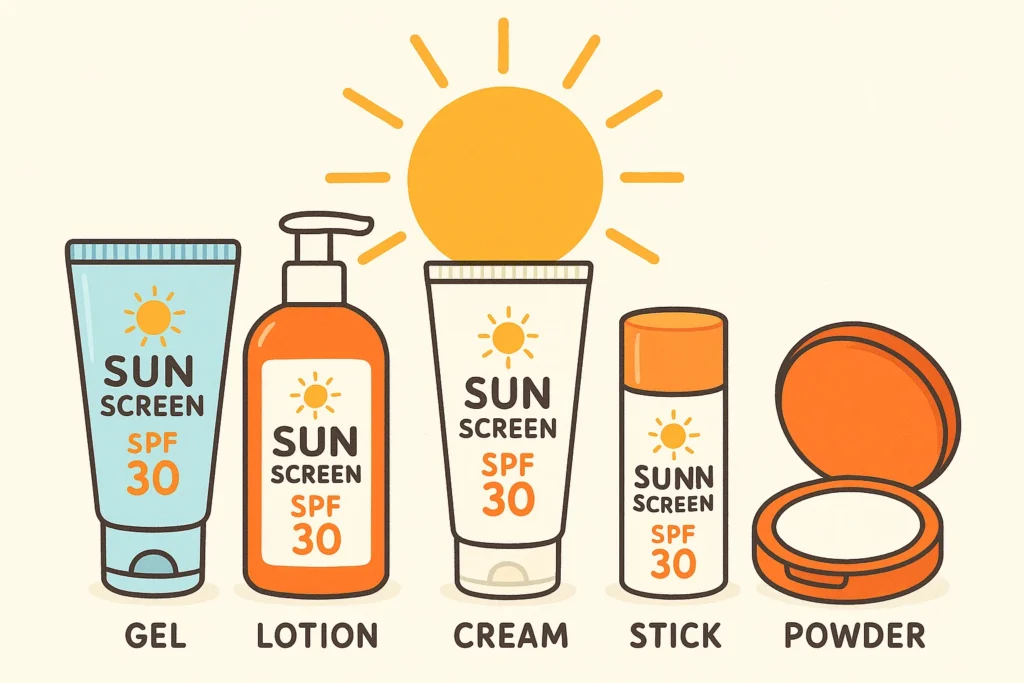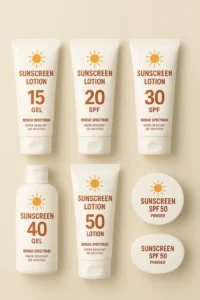
In today’s life, sun protection is an essential part of life. Dermatologists, beauty experts, and even wellness coaches agree that protecting the skin from the sun is the most effective way to prevent premature aging, sunburn, and long-term damage. Derma skin care products (sunscreen) give protection from sunlight.
What is sunscreen?
Sunscreen is a topical skincare product designed to protect the skin from the harmful effects of the sun’s ultraviolet (UV) radiation. It forms a protective barrier, either by absorbing UV rays or by reflecting them away, depending on the type of active ingredients it contains. In simple words, sunscreen is your skin’s shield against UV rays.
Sunscreen is no longer just a summer essential—it has become a daily skincare must-have. As a cosmetics manufacturer, understanding how sunscreens work not only helps you create effective products but also builds trust with skincare brands and end consumers.
Why does sunscreen matter?
Every time our skin is exposed to sunlight, it is affected by UV rays. Not only sunlight, but also our mobile phones, laptops, and even kitchen gas stoves emit UV rays, which damage skin. So sunscreen should be applied outdoors and is also needed indoors.
What Are UV Filters?
UV filters are the active ingredients in sunscreen that either absorb, reflect, or scatter harmful radiation before it damages the skin. They come in two main categories:
1. Chemical (Organic) UV Filters
These ingredients work by absorbing UV rays and converting them into heat, which is then safely released from the skin. Chemical filters are lightweight, transparent, and blend easily, making them popular in daily-wear sunscreens.
- Common examples: Avobenzone, Oxybenzone, Octocrylene.
- Benefits: Non-whitening, comfortable textures, and easy incorporation into creams, gels, and sprays.
2. Physical (Mineral) UV Filters
Mineral sunscreens, also known as inorganic filters, act like tiny mirrors, sitting on the skin’s surface to reflect and scatter UV rays. They are gentle, non-irritating, and often recommended for sensitive skin. Nowadays mineral sunscreens are highly recommended.
- Common examples: Zinc Oxide, Titanium Dioxide.
- Benefits: Immediate protection, safer for sensitive or children’s skin, and considered eco-friendly options.
Modern sunscreens often use a hybrid approach, combining both types for broad-spectrum protection and a better user experience.
Broad-Spectrum Protection
Broad-spectrum sunscreens that protect against both UVA and UVB rays. Not only do SPF numbers protect from sun damage, but also broad-spectrum sunscreens give protection.
- SPF (Sun Protection Factor) measures protection against UVB rays, which cause sunburn. For example, SPF 30 filters about 97% of UVB radiation.
- PA Rating (originating from Japan) indicates UVA protection. The more plus signs (+), the stronger the defense against long-term skin aging.
A successful sunscreen formulation must balance SPF, UVA protection, texture, and safety to meet consumer needs.

>- Gel or matte sunscreens: oily skin usually has breakouts. If we apply lotion or creams to oily skin. Oily skin will get more breakouts. So we use gel or matte sunscreen formulations. As compared to conventional cream or lotion formats, gel formats are very lightweight, non-greasy formulations with the ability to regulate oil production. It also has salicylic acid, which is non-comedogenic and prevents breakouts.
>- Sunscreen powders: represent an advanced form of photoprotection, formulated with micronized mineral filters such as zinc oxide and titanium dioxide. These physical UV filters act as a protective barrier, reflecting both UVA (responsible for skin aging) and UVB (responsible for sunburn) radiation. Unlike conventional cream-based sunscreens, powders are engineered to deliver a non-comedogenic, lightweight, and oil-absorbing effect, making them highly suitable for individuals with sensitive or acne-prone skin types. These kind of sunscreens are mostly used for oily skin types, acne prone skin and sensitive skin,Their dry formulation not only reduces surface shine but also ensures better stability against heat and humidity. While best used as a reapplication method over base sunscreen, they provide an additional layer of defense, especially for prolonged outdoor exposure, without disturbing makeup or topical treatments.It is a broad specturm sunscreen.
>- Sunscreen Cream: Dry skin always remains dehydrated and need deep hydration and mosiurtzer. So sunscreen creams are highly recommended for dry skin.Sunscreen creams are rich, emollient formulations designed to provide intensive hydration and long-lasting photoprotection. They usually contain organic (chemical) UV filters like avobenzone or octocrylene, or inorganic (mineral) filters such as zinc oxide and titanium dioxide. Due to their thicker texture and cream form a more occlusive layer on the skin, making them particularly suitable for dry, sensitive, or mature skin types. They not only defend against UVA and UVB radiation but also help strengthen the skin’s barrier by preventing transepidermal water loss. This makes sunscreen creams ideal for individuals exposed to harsh climates or with a tendency toward dryness and irritation.
>- Sunscreen Lotion: Not only the face, but our entire body also needs protection from sunlight. Sunscreen lotions are formulated to protect from the sun and harmful UV rays. Sunscreen lotions are lighter, fluid formulations created for easy spreadability and quick absorption. Typically water- or emulsion-based, they deliver broad-spectrum protection while maintaining a non-greasy, breathable finish. Lotions are well-suited for normal to oily skin types and are often preferred for daily wear or full-body application, as they cover larger areas efficiently. It is a broad specturm sunscreen.Their balanced texture ensures uniform distribution of UV filters across the skin, enhancing overall sun defense without feeling heavy. Many sunscreen lotions are also water-resistant, making them effective for outdoor activities and sports.
>- Sunscreen Stick: Sunscreen sticks are solid, balm-like formulations designed for targeted, mess-free sun protection. They are typically enriched with broad-spectrum UV filters—both mineral (zinc oxide, titanium dioxide) and chemical (avobenzone, octocrylene)—suspended in a wax or oil-based base that glides smoothly over the skin. Unlike creams or lotions, sticks provide a highly concentrated application, ensuring precise coverage for sensitive and easily exposed areas such as the face, lips, ears, and around the eyes. Their water- and sweat-resistant nature makes them especially effective during outdoor sports, beach activities, or travel. Additionally, sunscreen sticks minimize direct hand contact with the product, promoting hygienic and portable use while reducing the risk of spillage.
The science of sunscreen lies in the power of UV filters—they are the shield that protects skin from visible and invisible damage. For skincare brands, working with an expert cosmetics manufacturer ensures your sunscreen products deliver the protection, safety, and innovation consumers expect.
At DermTech Research, we specialize in custom sunscreen formulations and other derma skin care products, helping brands launch high-quality, dermatologist-approved sun care products tailored to market demand.
